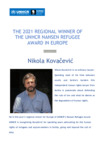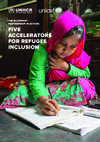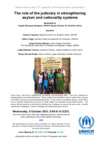16 Days Against Violence: UNHCR deeply disturbed by scale of violence against women
In 2012, some 12,000 incidents of sexual and gender-based violence were reported to UNHCR around the world, but many more cases never come forward.

Syrian refugee children attend a class in the Bekaa Valley, Lebanon. UNHCR chief António Guterres says humanitarian crises, like the conflict in Syria and Typhoon Haiyan in the Philippines, disproportionately affect children and adolescents and make them vulnerable. © UNHCR/S.Baldwin
GENEVA, November 25 (UNHCR) - UN High Commissioner for Refugees António Guterres said on Monday that the scale of sexual and gender-based violence was "deeply disturbing" despite the efforts of UNHCR and its partners to counter the "heinous" human rights abuse.
"In 2012, some 12,000 incidents were reported to UNHCR, but many more cases never come forward," Guterres said in a message to staff to mark the start of the annual 16 Days of Activism against Sexual and Gender-Based Violence.
He said that under this year's theme, "Safety in School," UNHCR aims to bring together boys and girls, teachers, parents, communities and partners to find durable and community-based solutions to prevent sexual and gender-based violence (SGBV) in school.
Guterres noted that humanitarian crises, like the conflict in Syria and Typhoon Haiyan in the Philippines, disproportionately affect children and adolescents. "Loss of family members, homes and ultimately futures, but also pre-existing gender inequalities and disruption of protective systems make boys, girls and youth extremely vulnerable to sexual and gender-based violence," he stressed.
The High Commissioner added that an estimated 60 million girls around the world are sexually assaulted on their way to school every year. Many boys and girls also face such violence in their classrooms and playgrounds. "This heinous human rights violation also carries significant human, social, and economic costs to our societies," he said.
"Recognizing the multi-faceted risks of SGBV that children and adolescents face, and the protective role education can play, UNHCR has focused in 2013 on integrating its strategies in the three core protection areas of SGBV, child protection and education," he explained. "Many operations are already developing mutually reinforcing programmes to protect girls and boys of concern from SGBV in school settings."
Guterres pledged that UNHCR, working closely with local partners and national authorities, would scale-up efforts to ensure safe learning environments, including through parent-teacher associations, youth clubs, extracurricular activities, the enforcement of codes of conduct, and confidential referral mechanisms for students to access health and psychosocial services.
"We know that by adopting a gender-sensitive approach to multisectoral services, for example by building separate latrines in schools or promoting the recruitment of female teachers among other measures, we can make girls and boys safer in school," he said.
Guterres noted that 148 UNHCR offices were implementing SGBV prevention and response programmes this year, making SGBV one of the highest selected objectives in country plans. But he added that safe learning environments "remain an under-programmed area in UNHCR operations."
UNHCR offices across the world, including the refugee agency's headquarters in Geneva, are holding events to mark the 16 Days of Activism and today's International Day to Eliminate Violence Against Women. For example, in addition to organizing cultural activities such as dancing, the UNHCR team in Burundi has also launched SGBV-related quizzes in schools as well as performances by teachers and students. Their objective is to focus on youth in order to help them understand how to prevent SGBV in schools, how to change behaviour in the long term to be more respectful of girls and women.
The 16 Days of Activism is an international campaign originating from the first Women's Global Leadership Institute in 1991. The 16 Days of Activism will run through to International Human Rights Day on December 10. It brings together UNHCR, partners, persons of concern and host communities worldwide in a united call to end sexual and gender-based violence in all its forms.
-

Winner's bio Europe: English
2 Oct 2021 -

Winner's bio Europe: Spanish
2 Oct 2021 -

Blueprint for Joint Action - Five Accelerators for Refugee Inclusion
1 Oct 2021 -

The role of the judiciary in promoting stronger nationality and asylum systems
1 Oct 2021 -

Your Guide to Protection Care Management
Oct 2021 -

Statelessness and Climate Change
Oct 2021 Climate change is a risk multiplier for displacement. The risks of statelessness can increase when people move, including during displacement situations in the context of climate change and disasters. -

Practical Guidance for UNHCR Staff on IDP Protection in the Context of Disasters and the Adverse Effects of Climate Change
Oct 2021 -

Issue brief - Promising practices from working with RLOs in Europe - UNHCR RBE - September 2021
30 Sep 2021 UNHCR's Regional Bureau for Europe conducted a comprehensive mapping of ongoing initiatives and engagement with refugee-led organizations in 2020. This Issue Brief seeks to summarize the main findings of this mapping exercise, share the promising practices identified in different countries, and provide practical tips to further support and reinforce the work done by refugee-led organizations and refugee-led initiatives across the region. -

EU-level Report on the status of refugee-led community organisations
30 Sep 2021 The main aim of this project is to see a dramatic improvement in the quality of enjoyment of human rights by refugees and is based on the idea of supporting the active inclusion of marginalised, vulnerable or excluded communities. With this, the project seeks to strengthen refugee inclusion by supporting the empowerment of those refugees who want to play an active role in their communities and at the EU level.
